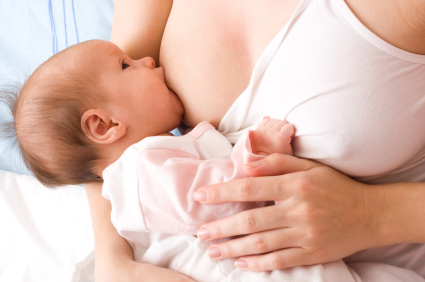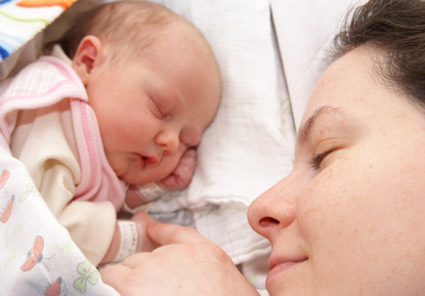If you are confusing and cannot decide
definitively to breastfeed your baby or not, you should read this article!

Breastfeeding
baby will reduce the risk of sudden death.
Mothers who have small children are not
strange to the expression 'Breast milk is the best food for babies'. And also
not by accident that this statement is widely recognized as correct.
Breastfeeding has many benefits that many mothers have not known yet.
Help motherhood be more binding
When breastfeeding, mother's uterus will be
retracted early, which prevents postpartum blood loss. Breastfeeding also
stimulates to create milk, and establishes the bond between mother and child.
In addition, some studies also show that those who do not breastfeed are at
higher risk of cancer than those with breastfeeding.

Motherhood
is more binding when moms breastfeed babies.
Increases resistance to baby
Colostrum is rich in nutrients and
antibodies that protect infants from infection. Babies’ immune system is still
far from perfect, so breastfeeding is a shield helping children increase
resistance.
Increase children’s IQ
In 2008, researchers at McGill University
discovered that those who have breastfed will have better result in IQ tests at
age 6.
Professor Michael Kramer believes:
"Breastfeeding in a long time helps develop children’s awareness and
intelligence."
Recent research shows that the fatty acids
in breast milk may rouse the development of brain, but other scientists believe
that the close relationship between mother and baby is created during
breastfeeding creating positive response to the child's brain.
Breastfeeding is associated with
the position in society
A 2007 study showed that infants are
breastfed will be more successful when growing up. Bristol University research
team has observed 1400 children born from 1937 to 1939 for 60 years. Children
who were breastfed have higher social ladder than bottle-fed infants by 41%.
Children breastfed in a long time will adapt more quickly to changes, research
result indicated.
Women who have a stable job also tend to
breastfeed longer than those who do many different jobs.
Reduced risk of sudden death
syndrome (SIDS) in infants
The American scientists examined data from
18 different studies to find an association between breastfeeding and sudden
death, and found that exclusively breastfed infants in the early months was 73%
lower risk of sudden death than other children.
The researcher suggested that breastfeeding
helps children reduce diarrhea, respiratory infections and strengthen immune
system, these factors are thought to be associated with sudden death.

Breastfeed
to avoid SIDS
Breastfeeding reduces the risk of
obesity
Breastfed children tend to gain weight more
slowly than bottle-fed infants. So simple, in breast milk contains leptin
insulin (hormone adjusts appetite). Moreover, newborns often stop breastfeeding
when they no longer feel hungry. This is the foundation to help form healthy
eating habits when they are adult.
More information
When deciding to breastfeed, most women worry
and wonder "How long for each breastfeeding time is reasonable?"
In fact that, the needs of each child is
not the same. Some babies cry for sucking just half an hour after the first
time but some are until 3-4 hours later having sign to 'recharge'. Therefore,
you should base on actual needs of your child for making feeding time so that
reasonable. On average, each child sucks about 8-12 times in 24 hours. Mothers
can breastfeed their babies fully as follows:
o
Wet diapers: 6-8 times in 24 hours
o
Very thick excrement: average 6-8 times in 24
hours and at least once a day during the first 2 months.
o
Weight gain is steady and consistent with age.
American Academy of Pediatrics recommends
that, you are never to exceed 4 hours at night and 3 hours during the day
without breastfeeding. If babies sleep deep, you should gently awake them to
make sure that they receive enough breast milk. Some children have a 'disease' to
be breastfed even when not having been awaked yet.